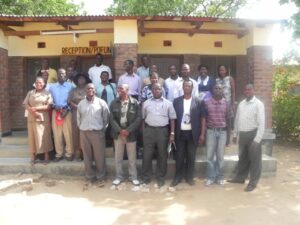 Following cases of disasters that normally hit the lower shire districts of Chikwawa and Nsanje, aspiring Members of Parliament for Nsanje have pledged to take an active role to ensure that the draft DRM policy which has been idle for two years is finally approved once voted as Members of Parliament.
Following cases of disasters that normally hit the lower shire districts of Chikwawa and Nsanje, aspiring Members of Parliament for Nsanje have pledged to take an active role to ensure that the draft DRM policy which has been idle for two years is finally approved once voted as Members of Parliament.
The aspirants pledged this when they signed commitment forms with Civil Protection Committee members drawn from all the constituencies in Nsanje district following an initiative by the development arm of the Episcopal Conference of Malawi Catholic Development Commission in Malawi (CADECOM) with funding from Oxfarm .
 Speaking at the signing in ceremony held at Bangula and Nchalo in Nsanje and Chikwawa respectively, the Program Coordinator for CADECOM Nation office, Yusuf Mkungula said Malawi as a country has greatly been affected by different types of disasters from time immemorial.
Speaking at the signing in ceremony held at Bangula and Nchalo in Nsanje and Chikwawa respectively, the Program Coordinator for CADECOM Nation office, Yusuf Mkungula said Malawi as a country has greatly been affected by different types of disasters from time immemorial.
He said Nsanje and Chikwawa districts in particular are mostly affected by disasters that include; heavy storms and hailstorms, dry spells, floods and droughts.
“Malawi is an already severely poor country facing an AIDS pandemic, chronic malnutrition, declining soil fertility, shortages of land among others. About 6.3 million Malawians live below poverty line, the majority in rural area, with more than 90 percent relying on rain-fed subsistence farming to survive. This evidence strongly suggests that increased droughts and floods may be exacerbating poverty levels, leaving many rural farmers trapped in cycle of poverty and vulnerability, “said Mkungula
Mkungula defined disaster according to United Nations International Strategy for Disaster Reduction (UNISDR) as a serious disruption of the functioning of a community or society involving widespread human, material, economic or environmental losses and impacts, which exceeds the ability of the affected community or society to cope using its own resources.
According to Mkungula, since 1990s, the incidence of disasters has become more frequent and the magnitude far reaching on Malawi’s population, economy and environment thereby affecting more people.
Once Voted into power the aspiring MPs have among others expressed their commitment to ensure that the Disaster Risk Management (DRM) bill and DRM Act have been approved and enacted respectively.
They will also make sure that a separate budget vote for DRM operations to Department of Disaster Management Affairs (DoDMA) has been created and enacted.
The other commitments signed ranges from making sure that there is adequate funding towards contingency plans and DRM operations to district, town, municipal and city councils through a separate budget vote
They have also pledged to ensure that there is enough influence to support approval of Climate Change Policy and the development and approval of the National Agriculture Policy.
Aspiring Member of Parliament for Nsanje North Frank Viyazyi said the review of Disaster Risk Management (DRM) policy is indeed crucial as this will make sure that resources are available to local councils and ultimately to victims.
He however said the DRM policy will substantially depend on the approval of the devolution plan which is still in the hands of Cabinet.
“I should say here that a good DRM act will depend on a refined DRM policy.This is why I challenge my fellow aspiring Members of Parliament who will be lucky and elected to work hand in hand with the Parliamentary Committee on Social Services to push for urgent approval by Cabinet,”said Viyazyi,a former legislator for Nsanje North Constituency.
Notable aspiring Members of Parliament that have signed the commitment included Haroon Mia (Chikwawa Nkombezi), Harry Thomson (Chikwawa North),John Zingale (Chikwawa West),Grain Malunga (Chikwawa North),Gloria Ntopi (Nsanje South)

Major disasters and trends that Malawi experienced a include 1949 famine,1991 Phalombe flash floods that killed over 500 people and 1288,000 people were affected and property worth 49 million kwacha was damaged.The other disaster is the 2001 food crisis which affected 3.2 million people.
